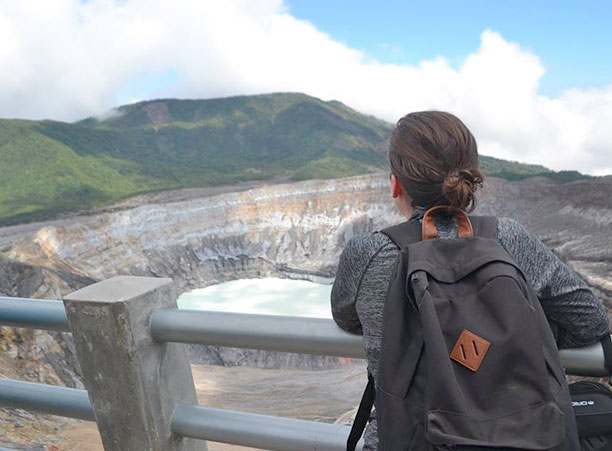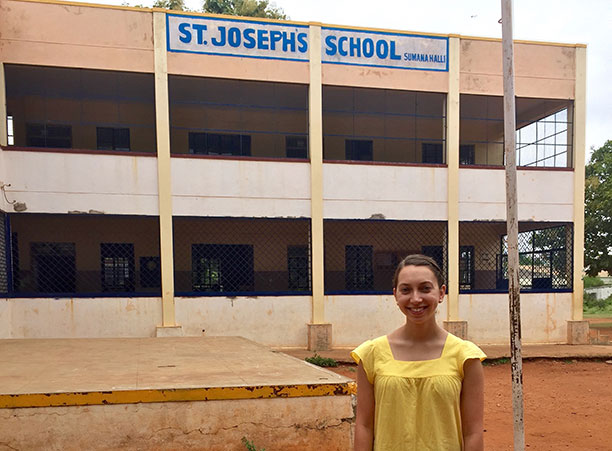 Many students come to College of the Holy Cross wanting to make a difference in the world. Four graduating seniors — Katie Bowles, Marie Therese Kane, Clare Orie, and Colleen Brady — are leaving the Hill ready to do just that through service to the Peace Corps.
Many students come to College of the Holy Cross wanting to make a difference in the world. Four graduating seniors — Katie Bowles, Marie Therese Kane, Clare Orie, and Colleen Brady — are leaving the Hill ready to do just that through service to the Peace Corps.
Traveling to locations in countries including Costa Rica, Nicaragua, and Rwanda, the students join 98 alumni (eight currently active) who have parlayed the skills and social awareness they explored on campus into global engagement in the Peace Corps.
Women on a Mission
While the draw is different for each Holy Cross student, the Peace Corps offers a range of service opportunities in an even wider range of places. The organization places volunteers in 60 countries, from Albania to Zambia, to work on projects as diverse as fighting HIV/AIDS and protecting the environment.
For Kane '18, an international studies major who will spend the next two years in Nicaragua, the light to serve switched on in a course called Catholic Economic Justice with Matthew Eggemeir and Peter Fritz, associate professors of religious studies.
"They encouraged me to open my eyes to the needs of the poor and the ways in which, as people in the U.S. and people who are privileged, we have a responsibility to be aware of those realities."
Kane traveled to Bangalore, India through a Maymester program where she learned about the impact of urbanization in India's "Silicon Valley" — where 70 percent of the city lives on less than two dollars a day.
"It made me want a longer immersion experience of that kind of encounter with people who live with very different means and have a whole different location in the world in terms of their own opportunity, privilege, and culture," Kane says. The trip also gave her confidence that she could handle a longer abroad experience such as the Peace Corps.
That taste for political engagement was reinforced for Orie '18 — who will be headed to Rwanda — through her involvement in Community-Based Learning (CBL), integrated courses that bring classroom learning to life through community projects and direct service opportunities. "It's been so formative — really moving beyond binaries, moving beyond power dynamics, and asking very hard questions."
Through CBL, Orie has taught English as a second language, and has been teaching and tutoring since her first year at Holy Cross. "It's really the reason why I want to become an English teacher — I've had such wonderful experiences with people in the community through CBL."
 Marie Therese Kane '18 stands in front of St. Joseph's School in Bangalore, India, where she taught during a Maymester trip. Kane will call Nicaragua home for the next two years while serving in the Peace Corps. Photo courtesy of Marie Therese Kane
Marie Therese Kane '18 stands in front of St. Joseph's School in Bangalore, India, where she taught during a Maymester trip. Kane will call Nicaragua home for the next two years while serving in the Peace Corps. Photo courtesy of Marie Therese Kane"I wanted to be a woman for and with others." Bowles says. "My time at Holy Cross — in my classes but also in spring break immersion, and Student Projects for Urban Development (SPUD) — has definitely helped me really think about the root causes of why we want to do service."
Bowles, an international studies major with concentrations in peace and conflict studies and gender, sexuality, and women's studies, took courses that expanded her understanding of environmental sustainability, poverty, and education.
One particular class, Anthropology of Gender and Development with Tsitsi Masvawure, visiting assistant professor of anthropology, struck an empowerment chord.
"She really challenged us to think about our American perspective and our various privileges and the way that impacts our perspective. It made me want to work in the world of international development in a meaningful way."
Service work is also the draw for Orie, who is majoring in international studies with a minor in French and a peace and conflict studies concentration. "I went into Holy Cross with this very particular idea of what I wanted to do, which is serve on the frontlines — in conflict zones and refugee camps," she says.
Alongside adventure, Orie is looking forward to challenging her preconceived ideas of what it means to volunteer. "Everything I've done at Holy Cross has complicated my understanding of what I want to do and has nuanced it and formed it in very important ways," she says.
As inspirational as on-campus classes have been for the Peace Corps-bound students, Bowles and Kane both studied abroad — in Costa Rica and Nicaragua on a Chaplain's Office immersion trip, respectively.
"It was a transformative experience," Bowles says. And one that convinced her that she wanted more — more meaning and more time. "I needed to understand or know more. That was when I really decided the Peace Corps was what I wanted to do."
Giving Peace a Chance
The Holy Cross seniors are approaching the Corps experience with open minds and open hearts.
There's nowhere Kane would rather be for the next two years.
"If I think of all the 'what-ifs,' I don't want to be anywhere else," she says. "Externally, people get nervous for me and say, 'Oh, what do your parents think?' 'Will you have running water?' I trust that there's a reason why I've been led to consider joining the Peace Corps and why I was chosen."
What's Orie looking forward to doing in Rwanda? "Oh my gosh, so many things!" she says with a laugh. But at the top of the list, she says, is the opportunity to learn from the ground-up.
"I have to learn everything," she says. "I don't speak Kinyarwanda, I don't know how the education system works. As much as we try to humble ourselves at Holy Cross, inherently we're in a position where that's not the case. So when I'm in Rwanda, I'm just so vulnerable to everything, really. I have to be so open."
Bowles is looking forward to reimmersing herself in the culture of Costa Rica — and she's also looking forward to getting involved with the local communities through the universal language of sport.
"One of my favorite things before was playing soccer with locals," she says. "I'm not a good athlete at all, and they take it very seriously!" Fortunately, Bowles will have plenty of time to practice — and there are a lot of ways to define winning when it comes to the Peace Corps.